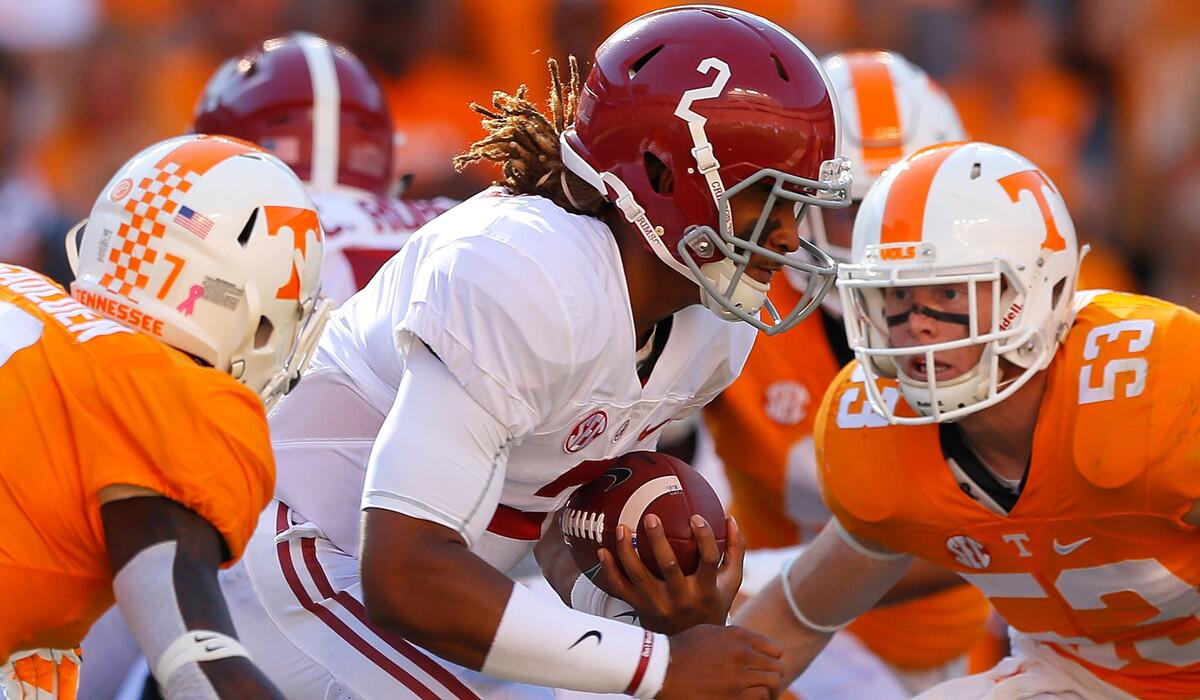From Alabama to Florida State to USC, young quarterbacks are making a major impact in college football

As a reward for leading Alabama to its biggest victory of the season, Jalen Hurts got chewed out on the sideline.
The quarterback heard it from his coach after several missteps in an otherwise impressive performance against Tennessee last weekend.
“He missed some throws. He missed some reads,” Coach Nick Saban said. “He turned the ball over twice in the first half.”
If that sounds like nitpicking after a 49-10 win over a nationally ranked opponent, Saban might be feeling uneasy about the top-ranked Crimson Tide’s relying on a true freshman under center for the first time in more than three decades.
Young quarterbacks have traditionally been seen as a risky proposition. Not enough experience. Not enough maturity.
That notion is starting to feel stale.
Sam Darnold has triggered USC’s turnaround, looking utterly comfortable in his first college action as a redshirt freshman. Deondre Francois of No. 13 Florida State and Alex Hornibrook of No. 10 Wisconsin have also excelled after sitting out their first season.
True freshmen have been handed the reins at major programs such as Georgia, Texas, Duke and Colorado.
“We’re seeing more and more of this,” said Brock Huard, a former Washington quarterback and current ESPN analyst. “With training starting at a younger age, these guys show up in college and they’re ready to hit the ground running.”
What used to be called a “Robo QB’’ — a passer trained from the crib — has now become the norm with private coaches, seven-on-seven leagues and “elite” summer camps at the prep level and younger.
Prospects are entering college with three and four seasons of starting for their high school teams. They have grown accustomed to playing big-name opponents from across the country, sometimes on national television.
“That’s years of working on fundamentals,” Huard said. “Really working the craft.”
It also helps that defenses are far less complex in college than in the NFL. Offensive coordinators can afford to streamline their playbooks for new passers.
Francois had the relative luxury of watching from the sideline for a season before jumping into the fire in this season’s opener against Mississippi. Facing an opponent that was ranked No. 11 at the time, he overcame a rocky start and led Florida State to a 45-34 comeback victory.
“First-time starter, I just had a lot of first-time jitters,” he said. “Once I got settled in, got banged up a few times, I felt better.”
Less than two months later, Francois leads all FBS freshmen with 1,876 yards passing. Darnold is doing just as well for the Trojans, ranking eighth among all quarterbacks with a 167.3 efficiency rating.
“I’m just going week by week,” he said after guiding USC to a victory at Arizona. “There’s a lot of stuff that I’ve learned these last few weeks.”
With 19-year-olds allowed to enter the NBA draft, college basketball has continued to skew young for years.
But football has been catching up, with Johnny Manziel of Texas A&M becoming the first redshirt freshman to win the Heisman Trophy in 2012. Jameis Winston of Florida State matched that feat the following year.
This trend has given rise to another — with more quarterbacks playing as freshmen, more sophomores have become established stars.
Lamar Jackson of Louisville and Jake Browning of Washington rank among the Heisman favorites this fall, each with a full season of experience under his belt.
Though hampered by injury — and the lack of a running game — UCLA’s Josh Rosen had been similarly heralded after leading the Bruins’ offense straight out of St. John Bosco High in Bellflower.
But earning the starter’s job at an early age is only part of the process. The new guys have to survive what can be a rough debut.
“You can do all the Elite 11 camps you want,” Huard said. “How you handle failure and adversity, both physically and mentally, that can only be gained within the fire of competition.”
The former quarterback has seen promising newcomers go bust because they could not deal with hard times.
At Washington, Browning has been careful to avoid watching television highlights or browsing social media. He said: “I don’t know what people are thinking.”
At Florida State, Francois’ teammates have seen the type of player not likely to be discouraged.
“A tough guy … mentally strong,” running back Dalvin Cook said. “That’s what you need out of a quarterback.”
Resilience could be essential to freshmen such as Shane Buechele at struggling Texas and Daniel Jones, who has had eight passes intercepted in seven games at Duke. Chason Virgil has played well at times but his Fresno State team is 1-6.
“You’ve just got to look at the film,” Virgil said earlier this fall. “See all the negative things you did and learn from them.”
Or you can learn from your coach on the sideline.
It is unclear what Hurts thinks of this season because Alabama freshmen are rarely allowed to speak with the media. But he has drawn accolades for keeping the Crimson Tide at No. 1.
“I had a talk with him before the season, telling him, ‘Step up, put the guys on your back, that’s what we look for in a quarterback,’” senior defensive back Eddie Jackson said. “And he’s doing that very well. He’s got our trust.”
Saban likes Hurts’ ability to scramble and make plays — he ran for three touchdowns in the Tennessee game. Also, he seems to take criticism well.
“I always ask him in the locker room, ‘Should I have gotten on you?’” Saban said. “And he says ‘yes.’”
As one of the growing number of young quarterbacks thrown into big-time college football, that could turn out to be his biggest asset.
More to Read
Go beyond the scoreboard
Get the latest on L.A.'s teams in the daily Sports Report newsletter.
You may occasionally receive promotional content from the Los Angeles Times.











